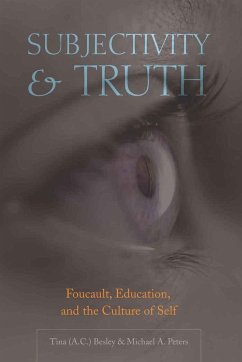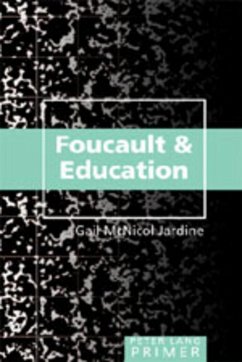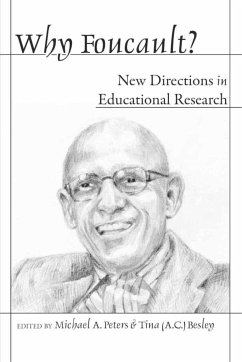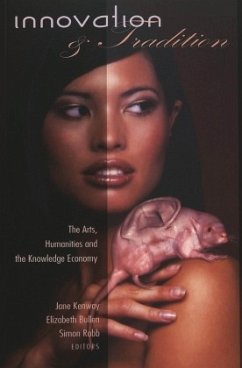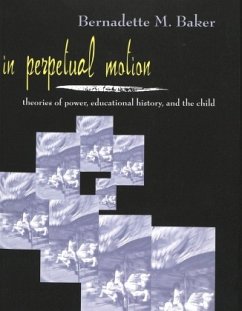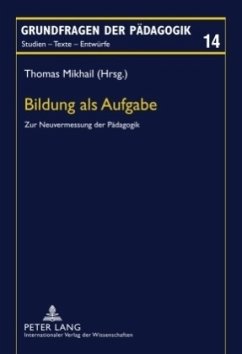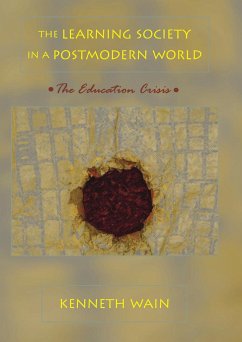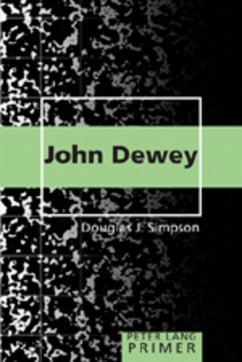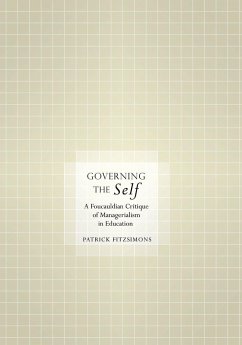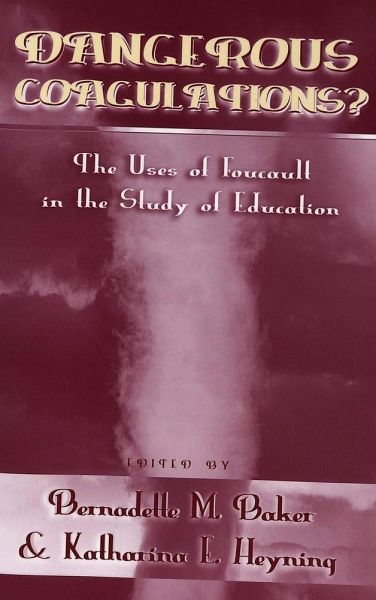
Broschiertes Buch
Dangerous Coagulations?
The Uses of Foucault in the Study of Education
Herausgegeben: Baker, Bernadette; Heyning, Katharina M.
Versandkostenfrei!
Versandfertig in 6-10 Tagen

PAYBACK Punkte
0 °P sammeln!





This book brings together an outstanding group of scholars who draw on the works of Michel Foucault. Eclectic in topic and method, the essays illustrate Foucault's usefulness. Dangerous Coagulations? constitutes a departure from the more formulaic Foucault work that has emerged and highlights new possibilities for undertaking problematizing approaches to educational research.
The Editors: Bernadette M. Baker is Associate Professor at the University of Wisconsin-Madison. In addition to her book, In Perpetual Motion: Theories of Power, Educational History, and the Child (Peter Lang, 2001), she has published papers in major educational journals on the history and philosophy of education, curriculum history and theory, and curriculum studies in international perspectives. Katharina E. Heyning is Associate Professor at the University of Wisconsin-Whitewater. Her teaching and research interests include the reform and change of teacher education and licensure, social studies education, history, and post-modern approaches to examining the social construction of schooling. She has published work in several volumes on issues of educational reform, cultural history, and early childhood education.
Produktdetails
- Eruptions: New Feminism Across the Disciplines 19
- Verlag: Peter Lang
- Artikelnr. des Verlages: 65814
- 1. Auflage
- Seitenzahl: 424
- Erscheinungstermin: 2. März 2004
- Englisch
- Abmessung: 225mm x 150mm x 23mm
- Gewicht: 600g
- ISBN-13: 9780820458144
- ISBN-10: 0820458147
- Artikelnr.: 24514922
Herstellerkennzeichnung
Lang, Peter GmbH
Gontardstraße 11
10178 Berlin
r.boehm-korff@peterlang.com
«Citations abound from Foucault in education: everyone wants a piece of power-knowledge it appears. But much use is greatly oversimplified. In this excellent collection of papers brought together by Baker and Heyning the complexity and variety of Foucault's own necter (his methods and topics) is well-represented and well-applied to education. In my view this is altogether a sparkling work and the contributors and editors are to be congratulated.» (Lynda Stone, The University of North Carolina at Chapel Hill)
«An outstandingly crafted introduction that is insightful and revealing about Foucault and his work, and the work of others regarding Foucault, which alone makes the book a must read. Following the introduction there are
«An outstandingly crafted introduction that is insightful and revealing about Foucault and his work, and the work of others regarding Foucault, which alone makes the book a must read. Following the introduction there are
Mehr anzeigen
brilliantly researched chapters dived into two sections: the first of which invites historical re-readings of Foucault, along with presenting discussion of timely topics (e.g., school uniforms and dress codes; student bodies and biopower, cosmopolitanism, and professionalism); and the second section which offers a rethinking of Foucault in a more sociological context (e.g., Foucault in the classroom; in interviews of teachers and students; in educational policy-making), all of which have been written by an excellent group of scholars. This volume is a compelling invitation to both novice readers and Foucault-familiar audiences - a stellar contribution to the field!» (Carl Grant, Hoefs-Bascom Professor and Chair, Dept of Curriculum and Instruction, University of Wisconsin-Madison)
«In 'Dangerous Coagulations' Baker and Heyning point the way forward, for a Foucaultian research agenda for educational studies. Their collection of conceptually rich and provocative essays offers us a picture as few other volumes have of the diverse ways in which contemporary researchers use Foucault's ideas as a lens for interrogating a range of important educational issues. This is a marvelous collection of essays for both scholars who work within the Foucaultian tradition as well as for those who wish to learn more about the interplay between Foucault's ideas and educational research.» (Barry M. Franklin, Professor and Head, Department of Secondary Education, College of Education, Utah State University, Logan, UT)
«No-one reading this volume will doubt the vitality of Foucault's approach to the governance of social and personal life. Here a rich array of studies investigate schooling not as an ideological mechanism but in terms of the whole variety of ways in which it forms and informs, nurtures and disciplines the children of the liberal state.» (Ian Hunter, Australian Professorial Fellow, Centre for the History of European Discourses, The University of Queensland, Brisbane, Qld. 4072, Australia)
«In 'Dangerous Coagulations' Baker and Heyning point the way forward, for a Foucaultian research agenda for educational studies. Their collection of conceptually rich and provocative essays offers us a picture as few other volumes have of the diverse ways in which contemporary researchers use Foucault's ideas as a lens for interrogating a range of important educational issues. This is a marvelous collection of essays for both scholars who work within the Foucaultian tradition as well as for those who wish to learn more about the interplay between Foucault's ideas and educational research.» (Barry M. Franklin, Professor and Head, Department of Secondary Education, College of Education, Utah State University, Logan, UT)
«No-one reading this volume will doubt the vitality of Foucault's approach to the governance of social and personal life. Here a rich array of studies investigate schooling not as an ideological mechanism but in terms of the whole variety of ways in which it forms and informs, nurtures and disciplines the children of the liberal state.» (Ian Hunter, Australian Professorial Fellow, Centre for the History of European Discourses, The University of Queensland, Brisbane, Qld. 4072, Australia)
Schließen
Für dieses Produkt wurde noch keine Bewertung abgegeben. Wir würden uns sehr freuen, wenn du die erste Bewertung schreibst!
Eine Bewertung schreiben
Eine Bewertung schreiben
Andere Kunden interessierten sich für




